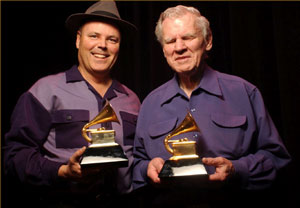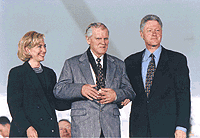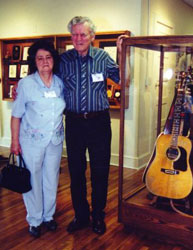Doc Watson, 1923-2012
| Posted
Tuesday, May 29, 2012, at 11:37 PM ET

Doc Watson performs in the Blues Tent at the 2009 New Orleans Jazz & Heritage Festival.
Photo by Chris Graythen/Getty Images
Photo by Chris Graythen/Getty Images
Doc Watson, the singer, guitarist, and songwriter who first became
nationally famous during the folk revival—but whose musical interests
extended beyond folk to blues, gospel, rock, and beyond—died yesterday
in Winston-Salem, N.C., after undergoing surgery. He was 89.
Born in 1923 in unincorporated Deep Gap, N.C., Watson seemed to many
folk revivalists the embodiment of traditional music. His father had
made Watson’s “first little stringed instrument,” as he told Terry Gross in 1988,
and taught him “a few of the old-time frailing or clawhammer banjo
style tunes.” (The instrument his father built him was “a fretless banjo
with a head made from the skin of a family cat that had just died.”)
“It was kind of hard for dad to show me,” Watson said, “because I
couldn't see his hands.” He had gone blind as an infant after an eye
infection.
But Watson didn't restrict himself to the “old-time” tunes. He bought
his first guitar from Sears Roebuck with money he got from chopping
down chestnut trees on the family field and selling it “for pulpwood to
the tannery.” And he took quickly to rockabilly, which he played
throughout the 1950s. In the early ’60s, however, the folklorist Ralph
Rinzler suggested he go back to the acoustic guitar and play the songs
he’d learned growing up. Watson took his advice and became a star of the
’60s folk scene.
He was best known for his versatile guitar picking. As David Menconi noted in a 2003 profile for the Raleigh News & Observer, Watson had “huge hands, working hands, and they make the guitar almost look like a toy.”
He was, above all, a versatile and immensely talented musician. “I’ve
enjoyed picking a lot of things besides old-time music,” he told
Menconi, who then watched him perform a wide range of songs, including
“Unchained Melody” and “Nights in White Satin.” Watson, Menconi noted, “never paid much attention to boundaries.”
http://www.slate.com/blogs/browbeat/2012/05/29/doc_watson_dead_at_89_the_great_guitarist_and_songwriter_was_much_more_than_a_link_to_the_past_.html?wpisrc=slatest_redirect?from=rss/&wpisrc=newsletter_slatest

At its 2005 commencement, Wilkes Community College
awarded its first ever honorary Associate in Arts degree to Arthel
"Doc" Watson. The college, located in Wilkesboro, North Carolina, is
the home of the annual Merlefest Americana music festival held in memory
of the late Merle Watson. Doc was recognized for his accomplishments
and his contributions to the college, the community and the region.
Read the full text of remarks made by Dr. Gordon Burns, President of Wilkes Community College, when presenting the degree at the 2005 graduation ceremony.
In 1997, Doc received the National Medal
of the Arts from President Clinton. This
award honors those who have encouraged the arts in America and offered
inspiration to others either through their distinguished achievement,
support or patronage.
Recipients of the National Medal of Arts are selected by the President of
the United States.
http://www.slate.com/blogs/browbeat/2012/05/29/doc_watson_dead_at_89_the_great_guitarist_and_songwriter_was_much_more_than_a_link_to_the_past_.html?wpisrc=slatest_redirect?from=rss/&wpisrc=newsletter_slatest
Doc Watson, Blind Guitar Wizard Who Influenced Generations, Dies at 89

Jack Vartoogian/FrontRowPhotos
Doc Watson performing in New York in 2005.
By WILLIAM GRIMES
Published: May 29, 2012 237 Comments
Doc Watson, the guitarist and folk singer whose flat-picking style
elevated the acoustic guitar to solo status in bluegrass and country
music, and whose interpretations of traditional American music
profoundly influenced generations of folk and rock guitarists, died on
Tuesday in Winston-Salem, N.C. He was 89.
Multimedia
Mr. Watson, who had been blind since he was a baby, died in a hospital
after recently undergoing abdominal surgery, The Associated Press quoted
a hospital spokesman as saying. On Thursday his daughter, Nancy Ellen
Watson, said he had been hospitalized after falling at his home in Deep
Gap, N.C., adding that he did not break any bones but was very ill.
Mr. Watson, who came to national attention during the folk music revival
of the early 1960s, injected a note of authenticity into a movement
awash in protest songs and bland renditions of traditional tunes. In a
sweetly resonant, slightly husky baritone, he sang old hymns, ballads
and country blues he had learned growing up in the northwestern corner
of North Carolina, which has produced fiddlers, banjo pickers and folk
singers for generations.
His mountain music came as a revelation to the folk audience, as did his
virtuoso guitar playing. Unlike most country and bluegrass musicians,
who thought of the guitar as a secondary instrument for providing
rhythmic backup, Mr. Watson executed the kind of flashy, rapid-fire
melodies normally played by a fiddle or a banjo. His style influenced a
generation of young musicians learning to play the guitar as folk music
achieved national popularity.
“He is single-handedly responsible for the extraordinary increase in
acoustic flat-picking and fingerpicking guitar performance,” said Ralph
Rinzler, the folklorist who discovered Mr. Watson in 1960. “His
flat-picking style has no precedent in earlier country music history.”
Arthel Lane Watson was born in Stoney Fork, N.C., the sixth of nine
children, on March 3, 1923. His father, General Dixon Watson, was a
farmer and day laborer who led the singing at the local Baptist church.
His mother, Annie, sang old-time ballads while doing household chores
and at night sang the children to sleep.
When Mr. Watson was still an infant an eye infection left him blind, and
the few years of formal schooling he received were at the Raleigh
School for the Blind. His musical training, typical for the region,
began in early childhood. At the age of 5 or 6 he received his first
harmonica as a Christmas gift, and at 11 his father made him a fretless
banjo with a head made from the skin of a family cat that had just died.
Arthel dropped out of school in the seventh grade and began working for
his father, who helped him get past his disability. “I would not have
been worth the salt that went in my bread if my dad hadn’t put me at the
end of a crosscut saw to show me that there was not a reason in the
world that I couldn’t pull my own weight and help to do my part in some
of the hard work,” he told Frets magazine in 1979.
By then, Arthel had moved beyond the banjo. His father, hearing him
plucking chords on a borrowed guitar, promised to buy him his own guitar
if he could teach himself a song by the end of the day. The boy taught
himself the Carter Family’s “When the Roses Bloom in Dixieland,” and a
week later he was the proud owner of a $12 Stella guitar.
Mr. Watson initially employed a thumb-picking style, in which the thumb
establishes a bass line on the lower strings while the rest of the
fingers pick out a melody or chords. That soon changed.
“I began listening to Jimmie Rodgers recordings seriously and I figured,
‘Hey, he must be doing that with one of them straight picks,’ ” he told
Dirty Linen magazine in 1995. “So I got me one and began to work at it.
Then I began to learn the Jimmie Rodgers licks on the guitar, then all
at once I began to figure out, ‘Hey, I could play that Carter stuff a
lot better with a flat pick.’ ”
To pay for a new Martin guitar bought on the installment plan, Mr.
Watson played for tips at a cab stand in Lenoir, N.C. Before long he was
appearing at amateur contests and fiddlers’ conventions. One day, as he
prepared to play for a radio show being broadcast from a furniture
store, the announcer decided that the young guitarist needed a snappier
name and appealed to the audience for suggestions. A woman yelled out,
“Doc!,” and the name stuck. (Last year, a life-size statue of Mr. Watson
was dedicated in Boone, N.C., at another spot where he had once played
for tips to support his family. At his request the inscription read,
“Just One of the People.”)
In 1947 he married Rosa Lee Carlton, the daughter of a local fiddler.
The couple’s first child, Merle, took up the guitar and began performing
with his father in 1964. Their partnership, which produced 20 albums,
ended with Merle Watson’s death at 36 in a tractor accident in Lenoir in
1985. Mr. Watson is survived by his wife; his daughter, Nancy Ellen; a
brother, David; two grandchildren; and several great-grandchildren.
In 1953, Mr. Watson began playing electric guitar with a country dance
band, Jack Williams and the Country Gentlemen. The band usually played
without a fiddle, so Mr. Watson learned how to play lead fiddle parts on
the guitar, often complicated melodies executed at top speed. This
technique, which he carried over to the acoustic guitar, became a
hallmark, exemplified by his much imitated version of “Black Mountain
Rag.”
In 1960 Mr. Rinzler, the folklorist, was attending a fiddlers’
convention in Union Grove, N.C., when he encountered Clarence Ashley, an
old-time folk musician better known as Tom Ashley, whom he persuaded to
sit for a recording session. Mr. Ashley put together a group of top
local musicians that included Mr. Watson on banjo and guitar. Impressed,
Mr. Rinzler went to Mr. Watson’s home and recorded him with family
members, including his father-in-law, Gaither Carlton.
A year later Mr. Watson, Mr. Ashley and several other musicians gave a
concert at P.S. 41 in Greenwich Village sponsored by the Friends of Old
Time Music. The performance led to appearances at colleges and folk
festivals and a solo career for Mr. Watson, who became a star attraction
at clubs like Gerdes Folk City and an audience favorite for his folksy,
humorous banter onstage. He was invited to appear at the Newport Folk
Festival in 1963 and 1964. In 1963 he performed at Town Hall in
Manhattan with the bluegrass pioneer Bill Monroe.
In the meantime Folkways released “Old Time Music at Clarence Ashley’s”
and “The Watson Family,” and Vanguard released Mr. Watson’s first solo
album, “Doc Watson.” His recordings for Folkways and Vanguard in the
1960s are regarded as classics.
Despite his image, Mr. Watson was not a folk-music purist. Even as a
child he absorbed big-band jazz and the guitar playing of Django
Reinhardt, whose records he heard at school. “I can’t be put in a box,”
he told Fred Metting, the author of “The Life, Work, and Music of the
American Folk Artist Doc Watson” (2006). “I play traditional music and
whatever else I’m drawn to.”
His catholic tastes expressed themselves on albums like “Good Deal!”
(1968), recorded in Nashville with mainstream country musicians;
“Docabilly” (1995), a return to the kind of rock ’n’ roll he had played
in the 1950s; and the eclectic “Memories” (1975), which included “field
hollers, black blues, sacred music, mountain music, gospel, rhythm and
blues, even traces of jazz,” the critic Chet Flippo wrote in his liner
notes.
Folk audiences, however, saw Mr. Watson as a direct conduit to the roots
music of Appalachia, which he played with conviction. “To me the
old-time fiddling, the old-time ballads — there never was anything
prettier and there never will be,” he said.
Mr. Watson found touring hard to bear. “For a green country man not
really used to the city, it was a scary thing to come to New York and
wonder, ‘Will that guy meet me there at the bus station, and will the
bus driver help me change buses?’ and all that stuff, people not knowing
you’re blind and stepping on your feet,” he told The Washington Post.
“It’s scary, the road is.”
In 1964 Merle Watson, then 15, joined him as a rhythm guitarist and
eased most of the burdens of the road from his father’s shoulders. The
two performed together for 20 years, receiving Grammy Awards for the
albums “Then and Now” in 1974, “Two Days in November” in 1975 and “Big
Sandy/Leather Britches” in 1980. A sampling of their work was collected
on “Watson Country: Doc and Merle Watson” (1996).
Waning interest in folk music slowed Mr. Watson’s career in the late
1960s, but in 1972 he was invited to contribute to “Will the Circle Be
Unbroken,” an album that paired the Nitty Gritty Dirt Band with country
artists like Maybelle Carter, Merle Travis (Merle Watson’s namesake) and
Earl Scruggs. The record’s success brought Mr. Watson a new audience,
and he and Merle toured constantly until Merle’s death.
Mr. Watson returned to the road a week after the funeral. Merle, he
said, had appeared to him in a dream and urged him to carry on. In his
son’s honor, he helped found an annual music festival in Wilkesboro,
N.C., now known as Merlefest.
In the post-Merle period, Mr. Watson won Grammys for the albums “Riding
the Midnight Train” in 1987, “On Praying Ground” in 1991 and “Legacy” in
2003. His fingers were dexterous well into old age, as he showed on the
track “Whiskey Before Breakfast,” recorded with the guitarist Bryan
Sutton, which won a Grammy for best country instrumental performance in
2007. In concerts he was often joined on guitar by his grandson Richard, Merle’s son.
In 1997, President Bill Clinton presented Mr. Watson with the National
Medal of Arts at the White House. “There may not be a serious, committed
baby boomer alive who didn’t at some point in his or her youth try to
spend a few minutes at least trying to learn to pick a guitar like Doc
Watson,” Mr. Clinton said.
Quiet and unassuming offstage, Mr. Watson played down his virtuoso
guitar playing as nothing more than “country pickin.’ ” He told
interviewers that had he not been blind, he would have become an auto
mechanic and been just as happy.
“He wants to be remembered as a pretty good old boy,” said the guitarist
Jack Lawrence, who had played with Mr. Watson since the early 1980s.
“He doesn’t put the fact that he plays the guitar as more than a skill.”
Awards
Grammy Awards
Doc Watson has received seven Grammy Awards from the National Association of Recording Arts and Sciences for his records over the years. Details of the year and album honored are shown below.
|

David Holt and Doc Watson with their Grammy Award
for Best Traditional Folk Music Recording of 2002. (Photo courtesy of David Holt)
|
Wilkes Community College Honorary Degree
 Dr. Gordon Burns presents honorary degree to Doc Watson. Photo courtesy of Wilkes Community College. |
Read the full text of remarks made by Dr. Gordon Burns, President of Wilkes Community College, when presenting the degree at the 2005 graduation ceremony.
Other Honorary Degrees
The Universitey of North Carolina at Asheville conferred an honorary doctoral degree on Doc on May 16, 2009 at at its Spring 2009 Commencement Ceremony. Doc also received an honorary degree from Appalachian State University in Boone, North Carolina.Recording Academy Lifetime Achievement Award
In 2004, Doc Watson was awarded the Lifetime Achievement Award by the National Academy of Recording Arts & Sciences at their annual Grammy Awards show. This award is presented by vote of the Recording Academy's National Trustees to performers who, during their lifetimes, have made creative contributions of outstanding artistic significance to the field of recording. Unable to attend himself, Doc asked his agent and friend Mitch Greenhill to accept the award on his behalf. Read Mitch's acceptance remarks on behalf of Doc.Scots Trad International Presentation Award
Doc Watson was selected to receive the International award at the 2004 Scots Trad Music Awards. Doc is the first winner of this award, which recognizes the contributions of musicians who carry Scottish music to audiences throughout the world. Much of the traditional music in the region where Doc grew up came from the Scots/Irish families who settled there. Doc was selected for this award by the Scottish group The Battlefield Band. Pat Kilbride, the Battlefield Band's guitarist, also wrote a tune called "Doc Watson's Reel" to celebrate Doc's winning this award.
 National Medal of the
Arts
National Medal of the
Arts
In 1997, Doc received the National Medal
of the Arts from President Clinton. This
award honors those who have encouraged the arts in America and offered
inspiration to others either through their distinguished achievement,
support or patronage.
Recipients of the National Medal of Arts are selected by the President of
the United States.National Heritage Fellowship
In 1988, Doc was awarded the National Heritage Fellowship by the National Endowment for the Arts. The award was established in 1982 as a way to honor American master folk and traditional artists for their contributions to our national cultural heritage. Since then, it has awarded these one-time-only-fellowships annually to recognize artistic excellence, assist the artists in continuing their work, and present them and their respective forms of artistic expression to the nation. Twelve fellowships are awarded each year. Doc with Rosa Lee at the Doc and Merle Watson Mountain Folk Art Museum (Photo courtesy of Cove Creek Preservation & Development, Inc.) |




 p
p
 p
p


